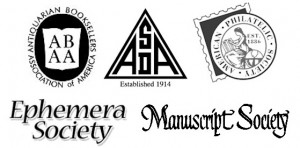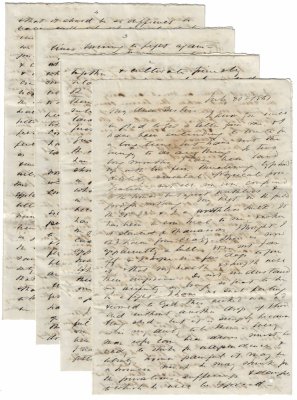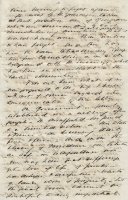Kurt A. Sanftleben, LLC
John Owen Lashley
1861 – An exceptionally detailed letter from a Confederate soldier regarding the defeat of the Union Army at the First Battle of Manassas (Bull Run)
List price has been discounted for this show.
$1500
Item Details
Manassas, Virginia, 1861, Letter
Very Good
This sixteen-page letter, dated July 30th, 1861, has been attributed to John Owen Lashley who at the time was a corporal in the 30th Regiment of Virginia Volunteers, which was redesignated as the 2nd Virginia Cavalry two months later. In nice shape.
In it, he described the Battle of First Manassas (also known as First Bull Run), which occurred on 21 July, just nine days before. The letter is addressed to his “Dear Sister” and recounts some specific incidents of heroic leadership and mentions several soldiers by name, including Morton Marye, David Hohnes and his two sons, as well as David Barton, Jno Pegram, and Ferd Skinner.
The letter reads in part:
“I know you will be glad to get a letter from me. I have been intending to write for a long time but have not the strength to do anything. In two long months I have been laid up with . . . typhoid [and] it started in Manassas. . ..
“My regiment in the field [is] the 30th Va [later redesignated as the 2nd Virginia Cavalry]. I hope in a few days to join it that my health & strength will there improve. . .. I trust under the providence of God that I may be able to do my duty. . ..
“On the Morning of the 21st early . . . a terrific fight was going on at Manassas & yet there was a great calmness and confidence in all our people. . .. Indeed it does seem so clear that God is on our side, & I think I can see his hand in every step that has been taken. . ..
“I believe . . . that if the southern states . . . had withdrawn from political their convention with the northern states before Lincoln came into possession of the government that there would have been no war [yet] how thankful we ought to be to have escaped from political communion with such a people. . .. This is a separation final, complete & absolute without the possibility of a re-union. . ..
“I have seen some of the northern papers lately & they refer to the fight of Thursday at Bull Run as if they obtained success. There is not a word of truth in it. They were utterly routed & driven back with great loss. The apparent retreat on one side to draw them into positions when they could be raked which was entirely successful. We lost very few. Morton Maye was Capt of a company & distinguished himself. . ..
“All the northern papers that saw the Exchange refer to masked batteries in the fight of Sunday. There was not a masked battery within three miles of the battle-field. The enemy crossed Bull Run higher up than our lines to turn our flank. . .. They were met by a few hundred men, who stoutly resisted them fighting but retreating slowly. . .. As they came in the retreat was slower until it was stopped . . . driven back & finally beaten from the field with terrific loss. . ..
“The enemy had rather an advantage of position & was more than two to one in the members actually engaged. Our President, who was on the field, telegraphed that their numbers in the fight were estimated at 35000 (the prisoners state higher) ^ that our force engaged did not exceed 15000. . .. It was a stand up fight with the advantages all on the enemies side except that God was on our side & gave our troops the courage and strength to win the fight. . ..
“Jno Pegram with less than 300 men & one piece of artillery fought more than ten times his number [and] more than half are now in the lines having to fight again. . ..
“Our loss at Manassas has not been officially known. It is supposed to not exceed 300 killed if so many & about twice that number wounded. . ..”
Lashley joined the Confederate Army in May of 1861 at Charlottesville, Virginia as a corporal in the 30th Regiment of Virginia Volunteers, which was redesignated at the 2nd Virginia Cavalry later that October. He was elected to serve as Second Lieutenant on 24 April 1862, First Lieutenant on 2 December 1862, and posthumously to Captain on 21 September 1865. Lashley was wounded and had his arm amputated about the time he was promoted to First Lieutenant. He died of an unspecified cause on 21 September 1864. The attribution of this letter to Lashley by a former owner may be incorrect as it is written to his “Dearest Sister.” While Ancestry.com is occasionally incorrect, it only identifies one sister for Lashley, who died in the 1850s.
Regardless of authorship, the letter is a fine recounting of the First Battle of Manassas from a Confederate soldier who witnessed it from his sickbed while recovering from Typhoid.
While later letters from soldiers who fought at First Manassas are not uncommon, letters written by soldiers while still on the battlefield are rare. At the time of listing, none are for sale in the trade. The Rare Book Hub shows one was sold for $3,500 at a Cowan auction in 2019. OCLC identifies three 1st Manassas battlefield letters, one at the Library of Congress, one at Duke University, and one at the University of Virginia. A soldier’s diary describing the battle is also held by the University of Virginia.
#10475
Kurt A. Sanftleben, LLC
Kurt A Sanftleben
2129 General Booth Blvd Suite 103-311
Virginia Beach, VA, 23454
United States
Phone: 757-716-3336
Cell: 571-409-0144
Featured Catalogue
Visit Website
Specialities
Paper Americana

More Information
Booth 23
Shipping and Returns
PAYMENT METHODS ACCEPTED - We accept Checks, Money Orders, and Credit Cards (Visa, MasterCard, American Express, Discover) via PayPal. Interbank transfers via Zelle are free and may be necessary for high-dollar-value transactions. Other domestic and international bank transfers may be possible for an additional fee. Institutions, well-established customers, and ABAA members may be invoiced; all others are asked to prepay. INSTITUTIONAL PURCHASES - We appreciate institutional constraints when it comes to complying with fiscal years, acquisition rules, foundation requirements, and donor concerns, so we’re always willing to hold items for a reasonable time for you to meet organizational purchasing, funding, and billing requirements. TRADE DISCOUNTS - We offer reciprocal trade discounts (sale items included) to known book, ephemera, and postal history dealers when paying by check or money order. Dealers unknown to us may be asked to document their status. DOMESTIC SHIPPING - Unless otherwise specified, orders are normally shipped free of charge by our choice of USPS Media, First Class, or Priority Mail. If requested, other shipping (e.g., UPS, FedEx, USPS Express Mail, etc.) shipping is at cost. INTERNATIONAL SHIPPING - Orders are normally shipped at cost via FedEx, USPS Priority International Mail, and USPS First Class International Mail. RETURNS AND REFUNDS - We accept returns for full refund less shipping for any reason provided the item purchased is returned to us within 14 days and in the same condition as sent. Please notify us in advance of any return shipment.
Open Times
If you'd like to discuss any of these items via Zoom, send me an email at [email protected] or a text at 571-409-0144 to set up a meeting.

